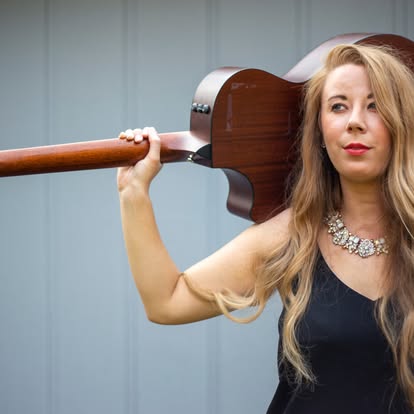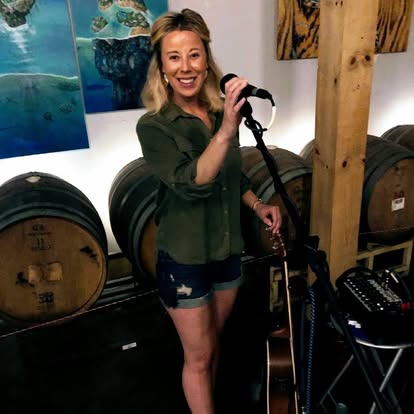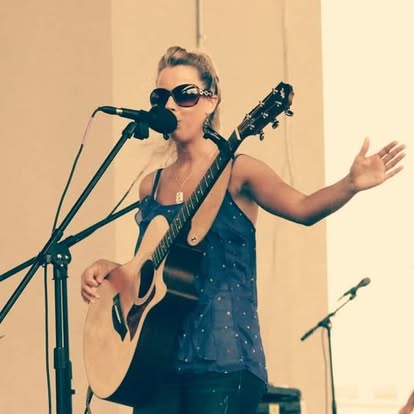

Rebecca Day shared their story and experiences with us recently and you can find our conversation below.
Rebecca, so good to connect and we’re excited to share your story and insights with our audience. There’s a ton to learn from your story, but let’s start with a warm up before we get into the heart of the interview. What’s the most surprising thing you’ve learned about your customers?
This is a great question. I don’t call my customers, “customers.” I call them supporters. Because without their support, I wouldn’t get to wake up every day and pursue what I’m passionate about as my life’s calling. I know many of them by name, and the ones I don’t know by name I work to get to know to the best of my ability. Being an independent writer and musician, there is no middleman between myself and those who are also invested in my craft. Over the years, sometimes people have suggested I should hand over certain aspects of my business to others so I’d have more free time. I’ve never been able to relinquish that control, because by relinquishing that control, I relinquish so much more, including my one-on-one relationships with those who’ve been affected and moved by my art. Really, we’ve built up a community, and I intend to stay fully committed to it no matter how busy I get.
Can you briefly introduce yourself and share what makes you or your brand unique?
I am an independent musician and writer. For the past decade, I’ve dedicated most of my musical efforts to my group, Rebecca Day and The Crazy Daysies. I’ve also released solo work over the years. My band and I have played countless shows over the years, including Porchfest in Jacksonville, Blue Crab Festival in Palatka, Shrimp Fest in Fernandina Beach, and Shrimp and Grits Fest in Jekyll Island. We’ve also taken the stage in the VIP lounge in West Palm Beach, Florida’s Coral Sky Amphitheater for concerts featuring Tim McGraw, Florida-Georgia Line, and Dan + Shay. I’ve performed solo shows and group shows for wonderful companies as well, including Purina, HP, Ashley Home Furniture, and Intel. I’ve also performed regularly for the King & Prince Resort in St. Simon’s Island, Georgia.
My group has also performed multiple times for Florida’s lifestyle TV program, First Coast Living, and I’ve appeared on the music industry’s popular podcast, Making it with Chris G.
My writing has been featured in publications such as Foundation for Economic Education, Zing Media, American Essence, and Jacksonville Magazine. I’m also a regular contributor for Epoch Bright, the arts and culture division of The Epoch Times, where I cover music-related stories.
I also run my own publication on Substack, Classically Cultured, and the tagline is, “Music and writing for people, not algorithms.”
I strive to instill a philosophical framework within each new story written and song penned. My aim is always to uplift and inspire, to provide comfort, and to remind each individual who comes across my work of their strength and their worth.
Okay, so here’s a deep one: Who taught you the most about work?
I grew up in an incredibly artsy household. My mother is a gifted writer, my father is a talented musician, and my sister, who is a part of The Crazy Daysies, is a lifelong violist. I grew up helping my mom in her home office, and loved it. While other kids wanted to take vacations to Disney World, I wanted to travel with my mom on her book tours. One of my earliest memories from my childhood is me staring at an artwork hanging up in our house featuring several of Leonardo da Vinci’s works. The piece is entitled “The Renaissance Man” and it now hangs in my home. Not only did I know from about 4 years old that I wanted to pursue a career in the arts, but the education I received at home not only in the craft of music and writing itself, but the business of it, has been invaluable for me as an adult navigating my own career in the arts and entertainment industry.
What did suffering teach you that success never could?
I deal with chronic pain on a daily basis due to a series of injuries at birth and subsequent illnesses and surgeries. The pain can make running a business, especially one so emotive as the arts, particularly tough. Though there are days when I lose battles, I win the war because I keep going no matter how hard it gets. In a way, this lifelong “fate’s hammer,” as Beethoven called his own suffering, the gradual and complete loss of his hearing, has set me up to be able to deal with the ups and downs of a highly competitive industry. Through my own suffering, I’ve gained empathy, wisdom, patience, and a unique perspective that helps others feel less alone. I don’t think success can really teach you any of those things. And it’s hard for me to even dream of the concept of success because an artist’s work is never done. My vision of success is this, “My work done my way.” And I strive for that everyday. I don’t take much time to celebrate the wins because I’m already on to the next work project, a new article, a new EP, a new client. I’m a worker bee and suffering, quite possibly more than anything, can cause you to throw yourself into your work with a dedication that is hard to explain. I don’t treat my work like a job. I treat it like a divine gift. I respect it, I nurture it, and I give my all to it. All this I learned from my pain, and I work all of the lessons, hardships, and triumphs into my art.
So a lot of these questions go deep, but if you are open to it, we’ve got a few more questions that we’d love to get your take on. Whose ideas do you rely on most that aren’t your own?
I wouldn’t say I necessarily rely on them, but they do guide me and reflect my own personal views. Ralph Waldo Emerson, the father of Transcendentalism, remains my go-to source for spiritual and artistic renewal. The transcendentalist movement echoes many of the values I hold dear, the importance of nature, the importance of individuality and walking one’s own path, and the importance of learning to think for oneself instead of parroting the talking points of those before us are tenets of the philosophy, and of my own. In a world full of people telling you what to think, Emerson implores the reader to do their own thinking. I think this is one of the most important things we can teach people right now. The most important idea is your own.
Before we go, we’d love to hear your thoughts on some longer-run, legacy type questions. If you laid down your name, role, and possessions—what would remain?
My soul. So besides pining for my books, I’d be okay.
Contact Info:
- Website: https://classicallycultured.substack.com
- Instagram: https://www.instagram.com/rebeccadaymusic
- Facebook: https://www.facebook.com/thecrazydaysies
- Youtube: https://www.youtube.com/rebeccadaymusic
- Other: rebeccadaymusic.com
rebeccadaywrites.com




Image Credits
Cover photo image credit (solo holding guitar): Durden Godfrey
Black and white duo smiling/sitting photo: Durden Godfrey
Duo image on stage: Joel Molotzak
Solo stage photo w/ sunglasses: Joel Molotzak
Solo smiling photo with mic: Rebecca Day Music











